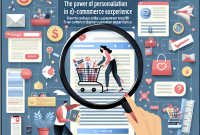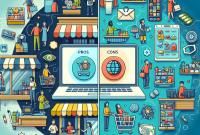
The Power of Personalization in E-commerce: How to Create a Customized Shopping Experience
Introduction
In today’s digital age, e-commerce has become a booming industry with countless options for consumers to choose from. With the vast amount of choices available, it’s becoming increasingly important for businesses to stand out and provide a unique and personalized shopping experience for their customers. The power of personalization in e-commerce is a crucial component of success in the modern marketplace. This article will explore the various ways in which businesses can create a customized shopping experience for their customers, ultimately boosting customer satisfaction, loyalty, and sales.
Understanding the Importance of Personalization
Personalization in e-commerce involves tailoring the online shopping experience to the individual preferences and behaviors of each customer. This approach allows businesses to connect with their customers on a deeper level, offering them products, promotions, and recommendations that are relevant and meaningful to their unique interests and needs.
Research has shown that personalization can have a significant impact on consumer behavior. According to a study by Epsilon, 80% of consumers are more likely to make a purchase when brands offer personalized experiences. Furthermore, 90% of consumers find personalization appealing, and 80% are more likely to do business with a company that offers personalized experiences.
Creating a Personalized Experience
There are several ways in which businesses can implement personalization in their e-commerce strategy. One effective method is to use data analysis and customer insights to understand individual preferences and behaviors. By gathering and analyzing data such as purchase history, browsing behavior, and demographic information, businesses can gain valuable insights into what their customers are looking for and tailor their offerings accordingly.
Another key aspect of personalization is the use of targeted product recommendations. By leveraging recommendation engines and algorithms, businesses can provide customers with personalized product suggestions based on their browsing and purchasing history. This not only helps customers discover products that are relevant to their interests but also increases the likelihood of making a purchase.
Moreover, personalizing the shopping experience can also extend to personalized promotions and discounts. By offering tailored promotions based on customer preferences and previous interactions with the brand, businesses can entice customers to make a purchase while also making them feel valued and appreciated.
Case Study: Amazon
Perhaps one of the most well-known examples of successful personalization in e-commerce is Amazon. The retail giant utilizes a sophisticated recommendation engine that provides personalized product suggestions to customers based on their browsing and purchasing history. This has resulted in a significant increase in customer engagement and sales, with a reported 29% increase in sales attributed to their recommendation engine.
The Future of Personalization in E-commerce
As technology continues to advance, the opportunities for personalization in e-commerce are becoming increasingly sophisticated. Artificial Intelligence (AI) and machine learning, for example, are revolutionizing the way businesses can understand and cater to their customers. These technologies can analyze vast amounts of data in real time, allowing businesses to deliver hyper-personalized experiences in a way that was previously not possible.
Furthermore, the growing trend of omnichannel retailing presents new possibilities for personalization. By integrating data from both online and offline sources, businesses can create a seamless and personalized shopping experience across various touchpoints, from websites and mobile apps to physical stores.
FAQs
How can businesses gather customer data for personalization?
Businesses can gather customer data through various means, such as tracking website interactions, analyzing purchase history, and collecting demographic information through user accounts or surveys. It’s important to do so in compliance with data protection regulations and respect customer privacy.
What are the benefits of personalization in e-commerce?
Personalization in e-commerce can lead to increased customer satisfaction, engagement, and loyalty. It also has the potential to boost sales and conversions by providing customers with relevant product recommendations and promotions.
Conclusion
The power of personalization in e-commerce is undeniable. By creating a customized shopping experience tailored to the unique preferences of individual customers, businesses can significantly enhance customer satisfaction, loyalty, and ultimately, their bottom line. As technology continues to advance, the possibilities for personalization in e-commerce will only continue to grow, presenting new opportunities for businesses to connect with their customers in more meaningful ways. Embracing and mastering the art of personalization is not only a competitive advantage but a key driver of success in the modern marketplace.






